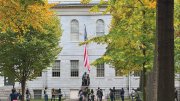Listen to the live audio recording.
Graduating senior Thomas Alan Dichter delivers his Senior English Address, “Memory and Celebration,” at Harvard's Commencement Exercises.
Today's commencement ceremony is an event rooted in the exercise of memory: memory institutional, historical, and personal. Today we sit where hundreds of graduating classes have sat before us, hearing the same solemn pronouncements uttered by dozens of University Presidents over the centuries. As we do each year, we gather as a University to revisit and reaffirm our traditions, marking our graduates' movement into the future by emphasizing our connection to the past; the degrees we are about to receive, after all, signify our successful absorption of a long-standing tradition of wisdom and scholarly memory. Today, amid the strains of old fight songs and the sounds of ancient languages, we look back at the academic, intellectual, and cultural foundations upon which we will construct our futures.
But memory carries responsibilities as well as rewards; it encumbers as well as enriches us. As the class of 2008 disperses and spreads across the country and the globe, as we find our way into corporate boardrooms, hospitals, and classrooms, into houses of government and houses of worship, into laboratories and newsrooms and anywhere else our degrees and our talents and our ambitions may take us, we will confront a world deeply burdened by its past. As we leave behind dining halls and common rooms and Widener library, we will find ourselves part of a world laden with difficult memories, with ghosts of old (and not so old) injustices that continue to make their presence felt to this day.
Those of us who remain here in the United States will live, work, vote, and raise our children in the shadow of national crimes committed generations before we were born. The American tragedies of slavery and of the genocide carried out on this continent's original inhabitants can still be keenly felt today, most of all among some of our country's poorest and most vulnerable communities. They can still be seen at work in patterns of social and racial inequality that have left one out of one hundred Americans, and one in nine young African-American men, incarcerated in our ever-growing prisons. These, too, are the memories bequeathed to us by America's oldest university, memories we must acknowledge and embrace as our own just as sincerely as we accept the degrees that will soon be conferred upon us.
Our years here at Harvard have afforded us all, to some degree or other, a kind of respite from that world: eight semesters on these beautiful grounds to think, read, work, and play, to grow intellectually and personally. All prestige aside, these years of peace alone constitute a tremendous privilege. And this is something to be grateful for, something to celebrate, something worthy of a ceremony as grand and as proud as this one. Today we are accomplished—and we are lucky. And today is a day to rejoice.
Still, looking back at our time at Harvard, we will remember that this has also been a time of war, that since the class of 2008 first arrived here, over four thousand American soldiers, and a larger but still unknown number of civilians, have died in the wars in Afghanistan and Iraq. There are some among us today who have served in those conflicts, and others who soon will. There are those of us who have enjoyed the privileges of peace and security throughout our lives prior to coming to Harvard, and those of us who have not. Many of us will continue to enjoy the peace that we have known here; some of us may not.
But today we celebrate. Today is a day to revel in the memories of this 372-year-old institution and to reflect on the personal memories of Harvard we will carry with us for the rest of our lives. We should remember, too, that Harvard is a part of the world, not just a peaceful retreat. Harvard's own history is intertwined with America's, and it bears the impress of our nation's gravest errors. But Harvard and America have developed and changed side by side. However haltingly, they have grown older and wiser together, and continue to do so to this day. It took roughly 250 years for Harvard College to graduate an African-American or Jewish student, and 327 for it to graduate a woman. But here we all are today, members of an outgoing class that looks and thinks very differently from those of just a century ago. Harvard takes another step forward this morning, when a class of its students will finally be graduated by a female University President. Today is a day to remember and to celebrate. It is a day to look back and see that as a university and as a country we really have come quite a long way—and also a day to look forward, remembering how much farther we still have to go. Thank you.
(Text as prepared)





